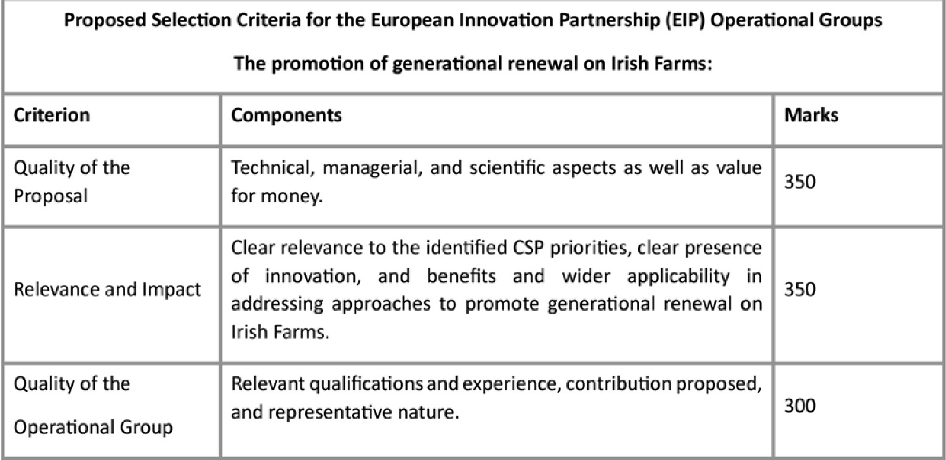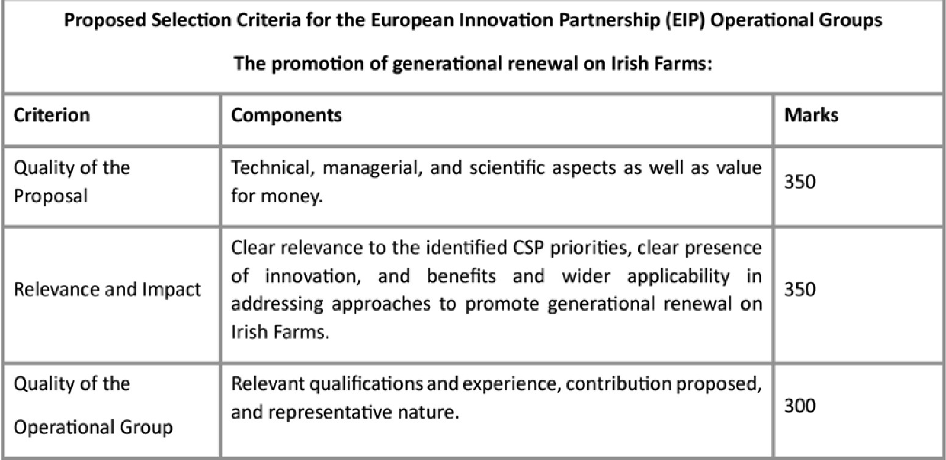2024
operational groups

Generational renewal in farming is one of the most pressing challenges faced by the agricultural sector in Ireland. The aging farming population poses a significant threat to the long-term sustainability and competitiveness of the sector. The extremely low proportion of young farmers leads to concerns about innovation, productivity, and the ability to meet the environmental and economic challenges that modern agriculture faces. Without a strong influx of younger generations, Irish agriculture risks stagnating, failing to adopt new technologies, and falling behind in meeting sustainability goals. The European Union's CAP also emphasizes generational renewal as key to maintaining a vibrant and resilient agricultural sector. On this regard, it is worth noting that young farmers, with a strong inclination toward investment and technology, are well- positioned to drive sector modernization. Engaging them in diverse rural networks facilitates knowledge exchange, collaboration, and innovation. Evidence shows that when training and advisory services accompany access to capital grants, installation aid, or Young Farmer (YF) supplements, the impact on intergenerational knowledge transfer is clearly positive; while the continuous advice and business planning throughout the installation process of YF, in the past, demonstrated an added value.
For this reason, Ireland has committed to addressing this challenge through the new CAP and additional national initiatives. The "Our Shared Future" Programme for Government underscores this commitment by supporting young farmers. Similarly, the Food Vision 2030 strategy, led by stakeholders in the agri-food sector, emphasizes the importance of generational renewal. It outlines several actions, such as sustaining existing levels of support, enhancing land mobility and succession planning, and promoting education and career diversity in the agri-food sector.
By applying an overall strategic but well targeted approach to modernization through innovations dealing with the different topics of the CAP, the managing authority of the CAP SP of Ireland (namely, DAFM - Irish Department of Agriculture, Food and the Marine) promotes the setting up of EIP-Agri OGs that specifically aim at addressing each of the specific objectives of the CAP, including the 7th “Generational renewal”.
In this specific case, a call for proposals by EIP-Agri OGs was launched having the goal of increasing the attractiveness of farming for young people by providing them with the tools, knowledge, and support systems necessary to succeed.
The call for EIP-OGs specifically calls for solutions addressing crucial issues relating to the young farmers installation and the generational renewal in Irish agriculture. Proposals are selected based on their relevance and impact to meet:
The selection of the EIP-OGs passes through the following 3 phases:
Phase 1: open call for the submission of initial proposals and their review by an evaluation committee.
Phase 2: Applicants who pass the first stage are invited to submit a more articulated and detailed project proposal. This includes outlining administrative arrangements, identifying Operational Group partners, setting objectives, and specifying timelines and costs. The costs associated with preparing these detailed plans may be supported by this intervention, with proposals being evaluated by an expert panel.
Phase 3: Successful Phase 2 candidates will proceed to full project implementation, with funding provided for the associated implementation costs.
Successful projects have been based on an implementation period of between 3 and 5 years.

Source: Guidelines for first phase applicants (2024)
All applicants must meet a minimum score of 60% across each of the criteria to be considered for selection to Phase 2. Projects progressing to full implementation may receive up to €650,000 in funding, with the number of selected projects depending on the quality of the submissions.
The Irish CAP Network plays a crucial role in supporting the development of EIP proposals by providing resources and guidance for applicants. Through a webinar recording, it offers detailed information on Phase 1 requirements, including assistance options, tips for proposal drafting, steps to form an Operational Group, and the project selection process. Prior to Phase 2, the CAP Network will further support selected projects with guidance on requirements like project content, necessary documentation, and funding access. An evaluation committee will then assess proposals, focusing on feasibility, innovation, and practical implementation.
The replicability of this practice is due to:
The implementation of EIP-AGRI Operational Groups in Ireland has several benefits that extend beyond generational renewal:
Fourth Competitive Call for Proposals under the CAP Strategic Plan 2023-2027 - Guidelines for first phase applicants.